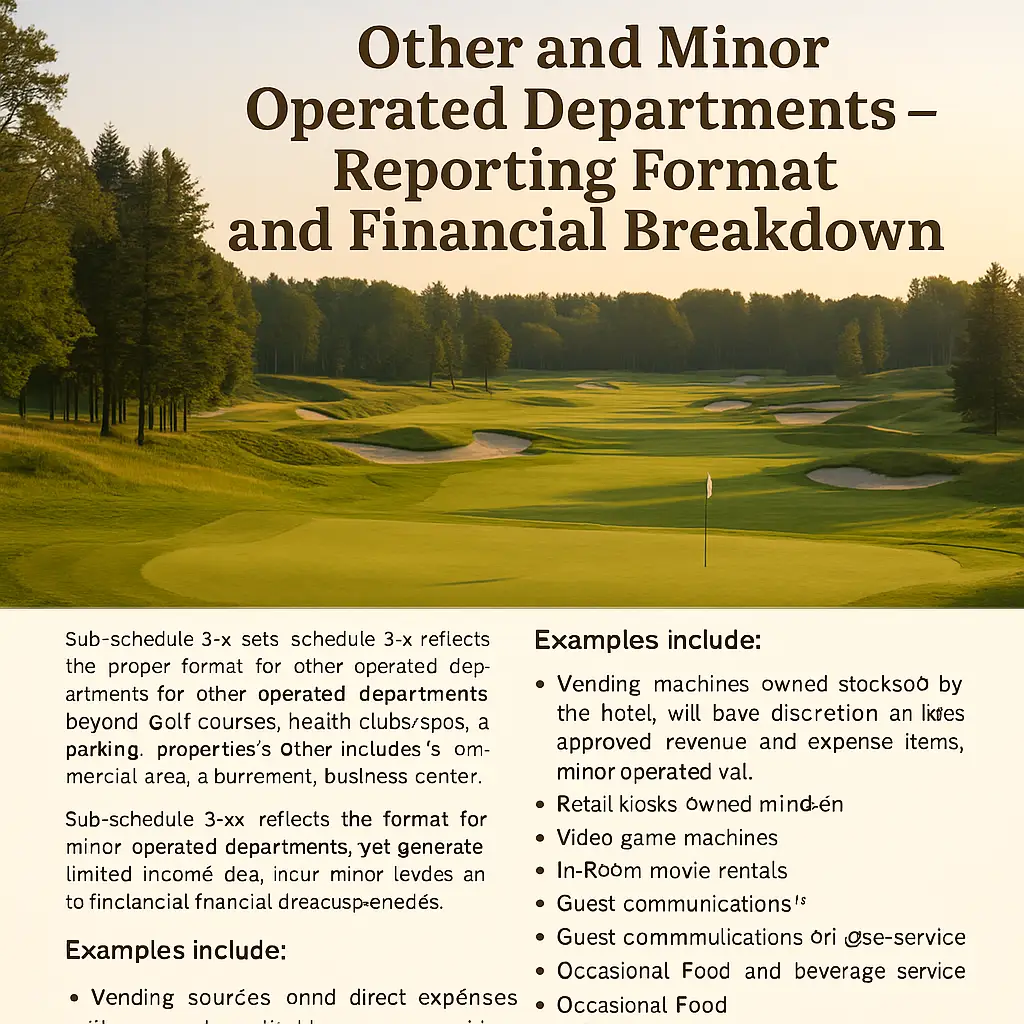Other Operated Departments — Schedule 3
Other Operated Departments—Schedule 3 presents the proper reporting format for departments outside the Rooms and Food and Beverage categories. This schedule summarizes the revenue and expense amounts for both Other Operated Departments and Minor Operated Departments within a property.
1. Reporting Guidelines and Structure
Only existing departments in a property are included in Schedule 3. For clarity and effective analysis, each major department should have its own sub-schedule. Minor Operated Departments should be summarized in a consolidated sub-schedule.
Naming Conventions
- Departmental line items should reflect the actual department name (e.g., Parking, Spa).
- Properties may customize the order or delete columns as needed while remaining compliant with the Uniform System.
Placement on Summary Operating Statement
- Total Departmental Revenue is reported under Operating Revenue—Other Operated Departments.
- Total Departmental Expenses is reported under Departmental Expenses—Other Operated Departments.
2. Definition of an Other Operated Department
To qualify as an Other Operated Department, the following criteria must be met:
- The department must generate revenue, incur direct operating expenses, and be run with the intent to generate profit or minimize loss.
- Revenues must be reported on a gross basis—before commissions, fees, or deductions.
- A department without revenue that exists solely to provide complimentary service is not considered an Other Operated Department. Instead, the expenses are allocated to the benefiting departments (e.g., complimentary guest parking costs allocated to Rooms or Food and Beverage).
- Complimentary guest calls and Internet costs are always recorded in Information and Telecommunications Systems—Schedule 6.
- If a property earns mostly net revenue (e.g., percentage commissions or profit sharing), the net income is reported as Miscellaneous Income—Schedule 4.
- A department fully operated and expensed by a third-party provider does not qualify as an Other Operated Department.
- If a third-party assumes the majority of risk and liability, then the operation is not classified under Schedule 3 but rather as Miscellaneous Income.
3. Required Sub-Schedules
Each major Other Operated Department must have a dedicated sub-schedule. Minor Operated Departments must be summarized into one consolidated sub-schedule.
Examples of Major Other Operated Departments:
- Golf Course and Pro Shop
- Health Club/Spa
- Parking
- Marina
- Guest Laundry
- Business Center
- Retail Store
Each sub-schedule should mirror the layout used in the Rooms and Food and Beverage departmental schedules, allowing consistency in reporting.
Minor Operated Departments
Minor Operated Departments are small-scale operations that generate limited revenue and incur minor direct expenses. They are presented in a simplified sub-schedule rather than a full departmental one. A key rule is that each revenue item must have a corresponding expense item, and vice versa.
Properties may delete or rearrange columns as long as they stay consistent with the Uniform System. Departments that include Labor Costs and Related Expenses should not be categorized as Minor Operated Departments.
Examples of commonly classified Minor Operated Departments include:
- Vending Machines: Vending Revenue & Vending Expenses
- Retail Kiosks (e.g., soft drinks, toiletries): Retail Revenue & Expenses
- Video Game Machines: Video Game Revenue & Expenses
- In-Room Movie Systems: Movie Rental Revenue & Expenses
- Guest Laundry (outsourced but hotel-supported): Revenue & Direct Expenses
- Guestroom Communications (e.g., Phone, Fax, Internet):
- Revenue: Guest Telephone, Internet, Fax
- Cost of Sales: Matching direct costs
- Services/CAM charges sold to third-party owners
- Occasional Food and Beverage Services (for hotels without routine F&B departments):
- Revenues: Occasional Food, Beverage, Room Rental
- Costs: Occasional Food/Beverage Cost of Sales, Other F&B Expenses
Note: Some revenue sources may instead be reported as net revenue under Miscellaneous Income—Schedule 4, depending on their structure. Refer to Part V for additional classification guidance.
Total Minor Operated Departmental Revenue, Total Expenses, and Profit are presented on Schedule 3, providing a summarized view of all minor activities in the property.

